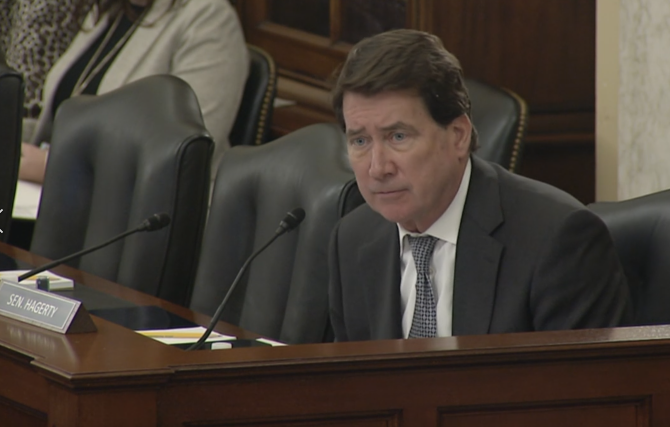Law ensures songwriters are paid fair market value for their work and makes it easier for them to obtain compensation for use of their music by streaming services
WASHINGTON—United States Senator Bill Hagerty (R-TN), a member of the Senate Rules Committee, questioned Shira Perlmutter, Register of Copyrights and Director of the U.S. Copyright Office, about the implementation of the Music Modernization Act (MMA) at an oversight hearing on the Library of Congress.
The Music Modernization Act, which was spearheaded by Hagerty’s predecessor Senator Lamar Alexander (R-TN) and signed into law by President Donald J. Trump in 2018, was the most comprehensive overhaul of music copyright laws in decades. The law ensures that songwriters are paid fair market value for their work and makes the process of obtaining compensation for use of their music by streaming services easier and more certain.
“The folks in my home state really care about songwriters and their music. And as I think about my state, the birthplace of country music is in Bristol and the music heritage runs all the way through our state to Memphis—that’s the home of the blues—and Nashville, which seems to grow every day as a hub for music. We have a very robust entertainment industry there, and it really is the heart and soul of Tennessee’s culture. […] I’m also pleased that songwriters and publishers are increasingly getting fair market value for their work, and that’s happening with much more speed and much more certainty. So, I applaud you for that, Ms. Perlmutter. I’d like to not only thank you for your leadership in implementing the Act, but I’d like you to just take a few minutes to describe some of the successes that you’ve observed as you’ve implemented the Act. And if you can identify next steps that you would see to increase that success,” Senator Hagerty said.
Perlmutter indicated that the Mechanical Licensing Collective (MLC), which is the non-profit entity designated by the U.S. Copyright Office to collect royalties from streaming services and distribute those royalties to songwriters and music publishers, began operation this year as planned and that hundreds of millions of dollars in royalties to artists have already been paid. She also noted that the U.S. Copyright Office continues to engage in educational outreach to songwriters and seek feedback regarding how implementation of the law may be improved.
“We have a website that informs the public of how the system works and what the relevant dates are—the implementation dates—and we’ve prepared extensive educational materials, a lot of them in writing. We have online video tutorials, we have a collection of interviews of members of Congress who are involved in passage of the legislation, and we also have created an MMA email newsletter. So we’re very actively involved. And I shouldn’t leave out the fact that we are actively engaging in partnering with organizations that represent songwriters and others who are affected, so that they will get the word out to their members. So I think all is going well. […] And as I’ve said, because our regulations were mostly issued on an interim basis, we are keeping watch to see whether any adjustments need to be made and we will be exercising oversight through the five-year designation process. Meanwhile, we’ve advertised that we welcome feedback from stakeholders via email during the interim period as we head along to the five-year date,” Perlmutter said.

*Click the photo above or here to watch*